Superior Physiological Functions
Folate Production
HRB are Highly Capable of Producing Folate in vitro
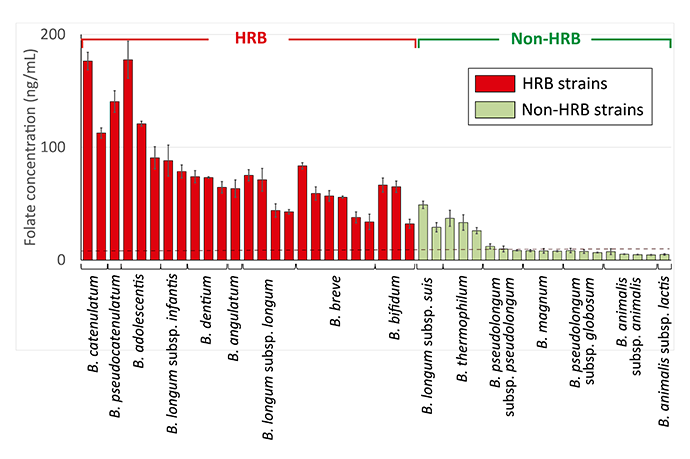
HRB and non-HRB possess differences in their capabilities to produce folate. In an in vitro study[1], the ability of 44 bifidobacterial strains to produce folate was evaluated. The results clearly revealed that HRB strains were able to produce high levels of folate in vitro, while most strains of non-HRB strains were not.
HRB-Colonized Rats had Higher Levels of Folate
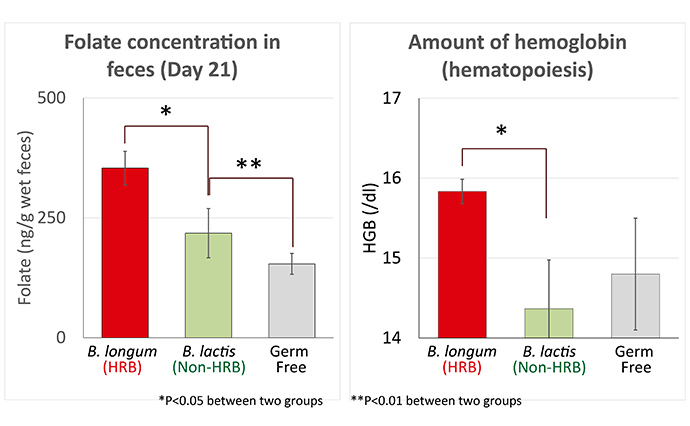
The ability of HRB strain to directly synthesize folate in the gut was confirmed in an animal study[1]. Germ free mice were administered with either a single strain of HRB (B. longum subsp. longum) or non-HRB (B. animalis subsp. lactis) on day 0. Fecal and serum analyses were performed on days 7, 14, 21, and 28.
The fecal folate concentrations and the amounts of hemoglobin were significantly higher in the mice colonized with HRB (B. longum), compared with mice colonized with non-HRB (B. lactis).
These studies demonstrated the superiority of HRB in folate production, suggesting folate-producing HRB strains could be more beneficial in anaemia prevention and conferring health benefits to the host.
Reference:
- 1Sugahara, H., Odamaki, T., Hashikura, N. and Xiao, J.-Z., 2015. Differences in folate production by bifidobacteria of different origins. Bioscience of Microbiota, Food and Health 34: 87-93.
 What is Folate?
What is Folate?Folate, also known as vitamin B9, plays an important role in host metabolism. Folate deficiency increases the risk for malformation of neural tube and megaloblastic anaemia, cancer, Alzheimer's disease and cardiovascular disease.
Degradation of Food-Derived Opioid Peptides
What are Food-Derived Opioid Peptides?
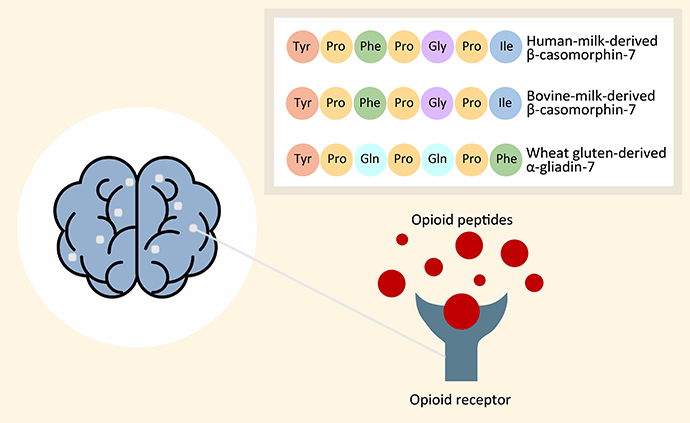
Opioid peptides are peptides that bind to opioid receptors in the brain and can influence the release of neurotransmitters.
Partial proteolytic digestion of food proteins will release groups of peptides exhibiting opioid activity in the intestine. β-casomorphin-7 derived from human breast milk or bovine milk and α-gliadin-7 derived from wheat gluten are examples of food-derived opioid peptides.
Opioid Peptides and Human Health
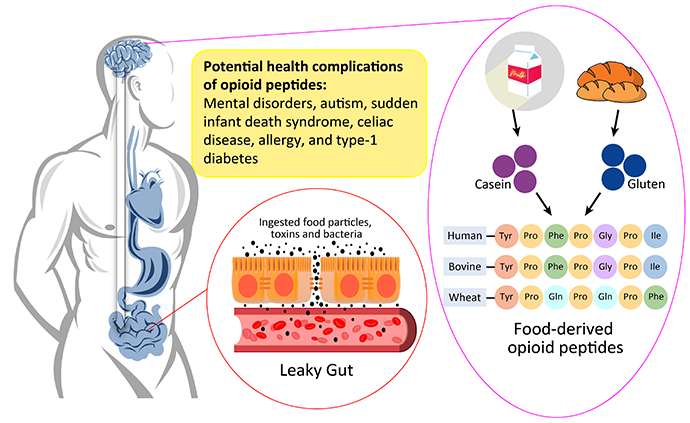
In normal condition, food-derived opioid peptides will be further broken down by enzymes and cause no harm. However, in the case of people with leaky gut or gut dysbiosis - a state of impaired gut microbiota - opioid peptides can cross the intestinal and blood-brain barriers, ultimately affecting the opioid receptor and central nervous systems.
Accumulating evidence suggest that food-derived opioid peptides such as β-casomorphin-7 can lead to a number of health complications in individuals who have sensitivities, especially in infants[1-3].
Because infants have an underdeveloped intestinal barrier function, food-derived opioid peptides are more likely to access to their brains. Consequently, infants with their immature central nervous system are more susceptible to heath disorders associated with opioid peptides[1-3], such as sudden infant death syndrome, atopic dermatitis, autism, celiac disease, and type-1 diabetes.
Reference:
- 1Sokolov, O., Kost, N., Andreeva, O., Korneeva, E., Meshavkin, V., Tarakanova, Y., Dadayan, A., Zolotarev, Y., Grachev, S., Mikheeva, I. and Varlamov, O., 2014. Autistic children display elevated urine levels of bovine casomorphin-7 immunoreactivity. Peptides, 56, pp.68-71.
- 2Hardy, M.Y. and Tye-Din, J.A., 2016. Coeliac disease: a unique model for investigating broken tolerance in autoimmunity. Clinical and Translational Immunology 5: e112.
- 3Kumar, J., Kumar, M., Pandey, R. and Chauhan, N.S., 2017. Physiopathology and management of gluten-induced celiac disease. Journal of Food Science 82: 270-277.
Capability of HRB to Degrade Food-Derived Opioid Peptides
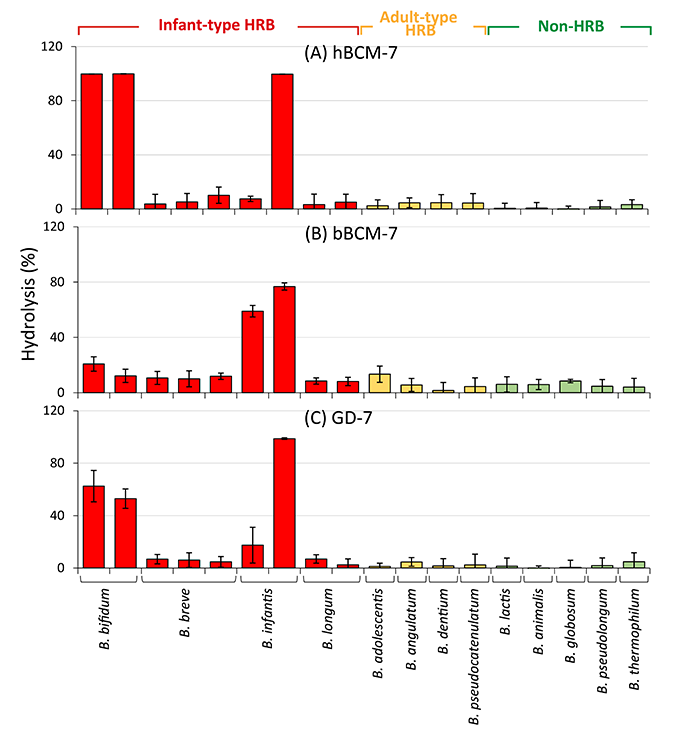
Considering these facts, Morinaga Milk conducted a study focused on the relationship between opioid peptides and infant health, specifically whether bifidobacteria can break down the potentially harmful food-derived opioid peptides[1].
The ability of HRB and non-HRB to degrade three different types of food-derived opioid peptides: β-casomorphin-7 derived from human breast milk (hBCM-7) and bovine milk (bBCM-7), and gliadorphin-7 derived from wheat gluten (GD-7) was evaluated.
Various strains of infant-type HRB proved more capable of degrading food-derived opioid peptides than the adult-type HRB and non-HRB, with 100% hydrolysis in certain strains of infant-type HRB.
This finding clearly indicates that infant-type HRB may potentially play a crucial role in eliminating food-derived opioid peptides in infant gut. The exact mechanism of action by which infant-type HRB eliminate these potentially harmful opioid peptides remain unclear. Further investigations are needed to better understand the functional health benefits of HRB in humans.
Reference:
- 1Sakurai, T., Yamada, A., Hashikura, N., Odamaki, T. and Xiao, J.Z., 2018. Degradation of food-derived opioid peptides by bifidobacteria. Beneficial microbes, 9(4), pp.675-682.
